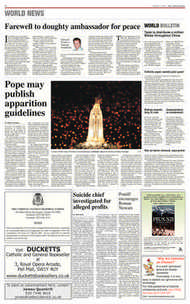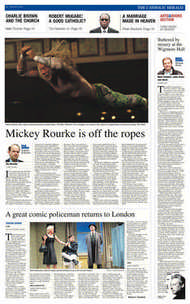Page 5, 16th January 2009
Page 5

Report an error
Noticed an error on this page?If you've noticed an error in this article please click here to report it.
Tags
Share
Related articles
Church Prays For End To Gaza Conflict
Archbishop Expresses Solidarity With Gaza Faithful
Archbishop: Pray For Peace Talks
Archbishop Kelly Backs Middle East Peace Efforts
No Advent Masses In Gaza Strip
Irish Cardinal Says Israel Should Lift Blockade Of Gaza
Archbishop renews calls for Gaza ceasefire
BY ED WEST
ARCHBISHOP Patrick Kelly of Liverpool has renewed his appeal calls for an immediate ceasefire in Gaza as he led a group of bishops visiting Christians in Bethlehem.
Speaking as the Israeli operation in Gaza entered its third week the archbishop said there had to be an “immediate ceasefire” to allow humanitarian aid into the Palestinian territory.
“There is an urgent need for humanitarian relief for the population of Gaza,” he said:“Violence is evil, especially when it blocks humanitarian aid.
“The first duty of leaders in this situation is to take the necessary steps to stop and avoid violence and to take the costly steps to engage in dialogue. What is needed now is a will on both sides to listen, understand and move towards reconciliation. History always judges as truly brave those who are open to any conversation that saves a single life.
“The agencies, supported by the Church, seek to serve all. However, they have a specific responsibility to the needs of the minority Christians and also to appreciate the role of religion and faith in this land. Any solution must recognise this land has to be home for two peoples and three religions.” Archbishop Kelly is leading the bishops of the Holy Land Co-ordination team, who are in the West Bank. The Episcopal Co-ordination in Support of the Church in the Holy Land was established in Jerusalem in 1998 at the request of the Holy See and is organised by the Catholic Bishops’ Conference of England and Wales. The group visits the Palestinian territories every January.
Their host, the Latin Patriarch Fouad Twal, said after a children’s procession in Bethlehem that “violence, no matter where it comes from or whatever form it takes, must be condemned. As we gather here together in the name and in the spirit of the Prince of Peace, the child who was born to be the light of the entire world and the hope of every human heart, I want to take this opportunity to condemn the violence in the Middle East and in a special way the attacks in the Gaza Strip. In two weeks these attacks have hurt Israel and the region more than all the rockets launched across the years.
“We are a people who have suffered and continue to suffer from violence for 60 years. We are also re-born children of God, whose Son came here and who suffered so that all may hope in His victory. Thus, our thoughts and prayers go, not just to the people of the Holy Land, but also to those in other lands who are also suffering discrimination on the basis of race, ethnicity or religion.” Hundreds of Palestinian civilians have been killed since the Israelis launched Operation Cast Lead on December 27, along with over 400 Hamas fighters. Ten Israeli soldiers and three civilians have also died. The Israelis launched the attacks in response to hundreds of rocket attacks that have been fired into southern Israel by Hamas, an Islamist group which does not recognise Israel.
Among the visiting bishops was Birmingham Auxiliary Bishop William Kenney, who said that while it was peaceful in the Fatah-controlled West Bank, “many are sad, not to say angry. They have relations in Gaza who are suffering, and even telephone contact is difficult because of the lack of electricity in Gaza. Many are repe tition, upset and nervous. They are not great friends with Hamas, although the Israeli action is likely to make them feel better disposed towards them.” The bishops had not visited Israeli officials but had met Israeli academics and were careful not to be seen to take sides. Their comments came just days after Vatican Cardinal Renato Martino compared conditions in Gaza to “a big concentration camp”.
Asked whether he thought the Israelis listened to the Church Bishop Kenney said: “I don’t know. I would say we’re certainly noticed. If we write anything we get reaction from the Israeli community. I certainly think we shouldn’t keep quiet.
“The Christian Palestinians have been extremely thankful, and have welcomed us in much more glowing terms than simply being polite would suggest. Visiting has certainly been the right decision.
“The wall is horrific, horrible, a large open prison. The wall is horrible. That doesn’t mean I approve of suicide bombers, but there must be other ways of doing it.” Asked whether the Christians felt optimistic about their future in Palestine, he said: “Unless things get better they want to get out. But if it gets better some will stay, and others will even come back. They love their country.” Catholic aid agency Cafod has said that Israel’s three-hour ceasefires are not long enough for them to provide aid.
Geoff O’Donoghue, Cafod’s director of international division, said: “Time is of the essence. It is imperative that a secure humanitarian corridor is established within the next 24 to 48 hours to allow immediate delivery of essential supplies and skilled personnel to help deal with this humanitarian crisis.
“While this would allow some short-term relief, it is no substitute for a permanent ceasefire, an end to the Israeli blockade of Gaza and rocket attacks into Israel.” According to reports 70 per cent of people in Gaza have no running water in their homes, and face increasing food shortages Mr O’Donoghue also warned that disease outbreaks were “inevitable” as services collapsed. Hospitals are now entirely reliant on generators, and with no fuel entering Gaza many machines are unable to run. Cafod has pledged an initial £50,000 towards an appeal by the Islamic Relief charity. Aid to the Church in Need is also sending £20,000 in aid to Gaza.
blog comments powered by Disqus





















